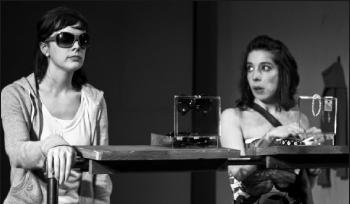By Steven Snyder
Emotional theft neither pretty, nor petty
The daughter visits her comatose father in the hospital. We can hear his every breath, as oxygen courses through the mask. Her crying is constant, but her words quickly veer from thoughts of sadness to those of outrage, and remorse. She loves him but she hates him; she misses him, but she can’t stand to make these regular hospital visits, hoping against hope that he will rise once again. It’s a show-stopper of a scene, and a mesmerizing moment of emotional confusion — and it begs the question: How does one cope with this tenuous state of in-between; of having a father who is still alive, but whose conscious existence has been stolen from you? He is functionally dead, but she cannot find closure.
Such an introspective, emotional crescendo would be reserved for the climax of most plays, but in the Flux Theatre Ensemble’s new concoction, it’s a surprisingly common occurrence. Written by Adam Szymkowicz (the prolific indie playwright of such works as “Food For Fish” and “Nerve” (which mixes the arc of a relationship with a first date, his latest yarn sprang to life through a curious case of art being manipulated by life).
It was 2004 when Szymkowicz took a class at the Flea Theater downtown — a collaborative workshop with playwright Chuck Mee (who was intrigued with the notion of having students steal and repurpose work from one another). “He was working on a play about the artist Joseph Cornell and, in theory, all our plays were supposed to be about him, and we were supposed to steal ideas from one another to use in our own stories,” Szymkowicz says. “But instead of writing about Cornell himself, I found myself creating a fictional character who, like Cornell, was obsessed with boxes and found objects. And through this class, I became fascinated with this notion of theft, and what it means to steal something from someone — even if that thing is just an idea. That’s how ‘Pretty Theft’ began.”
Springing from a workshop built around a culture of theft, “Pretty Theft” is a work that considers the many ways people steal from and exploit one another on a regular basis, robbing everything from emotions to sanity, and even innocence. Many of the concepts that were discussed in Szymkowicz’s workshop can be found in this production. One of his classmates referred to customers falling in love with waitresses, and a waitress subplot was born; another brought in an interview with the dancer Allegra Kent, and he was inspired to craft what would become his central character.
Five subplots are tied together, in Szymkowicz’s thesis on theft. Allegra (a wide-eyed, earnest and engrossing Marnie Schulenburg) is the innocent who visits her dying father in the hospital, who is demeaned at home by a mother who chips away at her self-esteem as a way of avoiding emotional intimacy. Working at a group home, Allegra befriends Bobby (a subdued Zack Robidas), an autistic savant who steals objects from his caretakers and hordes them in a cardboard box — his temper tamed only by these daily thefts.
Also working at the treatment center is Suzy (a gum-popping, cackling Maria Portman Kelly), Allegra’s good friend who finds fulfillment only through stealing cosmetics from department stores, and in stealing her friends’ boyfriends. Interrupting that story is a flirty subplot at a distant cafe, involving a smooth-talking guy (the charismatic Todd D’Amour) who introduces himself to the skeptical waitress (Candice Holdorf) as a professional robber.
“It moves in stages,” Szymkowicz says of the various plotlines. “The two girls freak out about something that happens at the group hone, and they get in their mother’s car and take off. Of course, they don’t tell the mom that they are stealing the car. This idea of theft and stealing – of why we do it and what we gain from it — is something I’ve never really investigated before. That’s why ‘Pretty Theft’ shows so many different gradients of this concept.”
In Allegra’s story, we see how her parents have stolen her naivety; in Suzy’s, we see how she uses theft to fill an emotional black hole. The guy at the cafe tries to use his thievery as a means of wooing a woman, while Bobby steals not out of choice but out compulsion. Just as Schulenburg, playing Allegra, so elegantly confronts her comatose father (angry at what he has stolen from her through no fault of his own), so does Bobby endure a painful confrontation with the staff at his group home when they decide he has behaved inappropriately. In a haunting sequence — his fractured state of mind depictured through dancing ballerinas, who appear throughout the production — he is taken from his room, given shot after shot by doctors, his mind wiped clean.
“It’s difficult, to create likable characters and to then watch bad things happen to them” Szymkowicz says, noting that the play also occasionally sees theft as a good thing. “It’s my one play where bad things are happening and all these people are trying to do is to get through to the other side, and that’s why I kept trying my best to put in something beautiful, like those ballerinas, that have symbolic meaning.”
The breakthrough moment in is not a cheerful resolution. Instead, it’s one character’s difficult realization that to defy this culture of exploitation, one must be courageous enough to be sincere. It’s a subtle, but profound point: That the key to a happy life lies not in lying to others to get what you think you need, but in looking inwards, and in focusing on being the best possible version of yourself.
Szymkowicz has not only taken the notion of theft and flipped it on its head — he’s taken a story about human beings at their worst and shown how we can claw our way back from the brink by finding the good within ourselves.




































